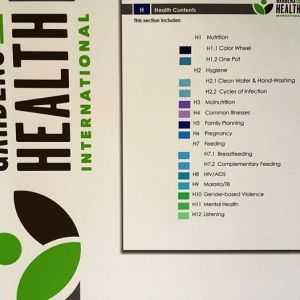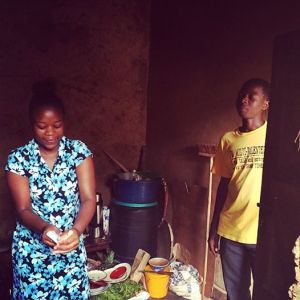Day Five . . .
We visit Gardens for Health International, an organization that sponsors families to educate them on planting and harvesting healthy crops and eating a balanced, nutritious diet. Combatting malnutrition and teaching families how to sustain healthy lifestyles is their goal.
Staff use their home base laboratory of five acres to grow and harvest seeds and baby plants to give to families and teach them how to tend them. Families have the choice of what plants they receive and the organization ensures that they choose a variety to make sure they have a balanced diet.
The farm is organic and chemical free. All of the nutrients come from the natural compost. Five tons of compost is distributed per hectare. The compost is separated between organic and inorganic materials so that decomposition is faster. Bugs are also useful in breaking down the matter.
Nutrients in the soil can be a problem. Agroforestry is used to strategically bring nutrients to the ground. It can also help calm down the erosion that the earth is prone to due to the wear and tear of planting and harvesting.
Rwanda has both rainy and dry seasons:
June – Sept (dry) and Sept – Dec (rainy)
The rainy season is when growth occurs and crops must be set aside to prepare for the dry season.
Indigenous plants:
Dodo plant (like spinach), Spider Plant (named after it’s shape), and Nightshade
Other plants:
Lufas (body scrubs) – look like cucumbers; they are grown, dried, and peeled in order to use.
Orange flesh sweet potatoes, corn (planted with 2 seeds per hole and take about 3-4 months to grow), kale (sukomuheekee), papaya (approx 8 months to grow), and yellow potatoes.
The staff was super hospitable and excited to show us their work. We sat down to a delicious, typical lunch with everyone. Mealtimes usually lack in words but are smothered with smiles.
Afterwards, we trek back to Akilah again to pick up another student, Esperanza. She leads us to her home and on the way we pick up her 10 year old little girl from school. Esther is beautiful, smooth skin, rich brown eyes and black hair, accented with a shy smile. When we arrive at Esperanza’s home we meet her other two children, Oliver (21 years old and studying computer sciences), and Olivia (18 years old with the hope of starting her studies in computer engineering).
Although we are still full from lunch a couple hours ago, we sit down again to a generous spread of the typical. Can too much Dodo be harmful? I guess I’ll find out! We ask Olivia how many hours it took her to prepare this meal for us. She quietly answers, “four hours.” Esperanza is also humble in admitting she borrowed chairs and dishes from all the neighbours in order to host us all. We are thankful and blessed. She asks Oliver to pray over our meal. We share in food and broken conversation.
“My life has been hard but God has been good,” Esperanza says. “One day, After I graduate, I hope I will be able to share my whole story. It is one that needs to be told.”
I am thankful to have shared in your story Esperanza, and I hope to hear the whole of it when you are ready.
Rwanda . . . Land of a thousand hills. I am thankful for the opportunity to tread upon your red roads and behold your beautiful body of land.
Your resilience has refined you and is rejuvenating for others who get to witness. Thank you for sharing your beauty, growth, hospitality, and hope. I am anticipatory for you future.

